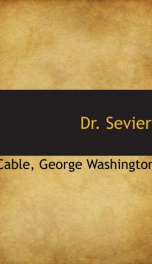Cable George Washington

George Washington Cable (12 October 1844 – 31 January 1925) was an American novelist notable for the realism of his portrayals of Creole life in his native Louisiana. His fiction has been thought to anticipate that of William Faulkner. Cable was born in New Orleans, Louisiana. He served in the Confederate Army during the American Civil War. At the end of the war in 1865, he went into journalism, writing for the New Orleans Picayune, where he would remain through 1879. By that time, he was a well established writer. His sympathy for civil rights and opposition towards the harsh racism of the era showed in his writings, earning him resentment by many white Southerners. In 1884, Cable moved to Massachusetts. He became friends with Mark Twain, and the two writers did speaking tours together. Cable died in St. Petersburg, Florida. "The party had the privilege of idling through this ancient quarter of New Orleans with the South's finest literary genius, the author of "the Grandissimes." In him the South has found a masterly delineator of its interior life and its history. In truth, I find by experience, that the untrained eye and vacant mind can inspect it and learn of it and judge of it more clearly and profitably in his books than by personal contact with it. With Mr. Cable along to see for you, and describe and explain and illuminate, a jog through that old quarter is a vivid pleasure. And you have a vivid sense as of unseen or dimly seen things--vivid, and yet fitful and darkling; you glimpse salient features, but lose the fine shades or catch them imperfectly through the vision of the imagination: a case, as it were, of ignorant near-sighted stranger traversing the rim of wide vague horizons of Alps with an inspired and enlightened long-sighted native." from Mark Twain's Life on the Mississippi
do you like this author?
What readers are saying
What do you think? Write your own comment on this book!
write a commentWhat readers are saying
What do you think? Write your own comment on this author!
write a commentBook list

BonaventureA Prose Pastoral of Acadian Louisiana
Series:
Unknown
Year:
Unknown
Raiting:
4/5
Show more
add to favoritesadd In favorites

Strong Hearts
Series:
Unknown
Year:
Unknown
Raiting:
4.5/5
Classic American novel by the American novelist notable for the realism of his portrayals of Creole life in his native Louisiana. His fiction has been thought to anticipate that of William Faulkner. --This text refers to an alternate Paperback edition.
Show more
add to favoritesadd In favorites
Book list

BonaventureA Prose Pastoral of Acadian Louisiana
Series:
Unknown
Year:
Unknown
Raiting:
4/5
Show more
add to favoritesadd In favorites

Strong Hearts
Series:
Unknown
Year:
Unknown
Raiting:
4.5/5
Classic American novel by the American novelist notable for the realism of his portrayals of Creole life in his native Louisiana. His fiction has been thought to anticipate that of William Faulkner. --This text refers to an alternate Paperback edition.
Show more
add to favoritesadd In favorites

Strange True Stories of Louisiana
Series:
Unknown
Year:
Unknown
Raiting:
5/5
George Washington Cable's Strange True Stories of Louisiana was first published in 1888. It consists of seven captivating and amazing, but still true stories set in Louisiana. The book starts with Cable’s telling his readers how he acquired these other seven stories. These are true stories from people who lived in Creole Louisianna (from 1782 to after the Civil War), a time hardly intelligible to us now. That’s why the stories must have been strange to George Cable himself, because rather long time had passed even before his birth, then the stories impressed him a lot.
The first story “The Young Aunt with White Hair" is a tragic one and depicts the horrors experienced by a young woman on the long journey to New Orleans from Germany: she was robbed by sailors on the ship; saw murder of her husband and baby; almost became a chief's dinner. She underwent many severe trials that her hair eventually turned snow white in a few hours, instead of decades, and she never recovered from the experience. In the second story we feel no more tragic, but bright and happy humor and suspense that make "The Two Sisters" just plain fun to read. Two teenage girls Francoise and Suzanne, that are totally different in character, travel through the "wilds" of Atchafalaya swamp to North Louisiana in 1795. The next story "Alix de Morainville" reads like a fairy tale: the birth-deformed baby farmed out to a peasant family, many other adventurous events and eventually introduction to Queen Marie Antoinette; Aleix's grand wedding at Notre Dame Cathedral; the beginning of the French Revolution; death of her first husband; rescue; and flight first to England and then to Louisiana. The other story "Salome Muller, The White Slave," tells the story about the German woman who lost most of her family on the way to Louisianna. Salome became a slave. Only in some about 20 years her case was taken to the State Supreme Court by her family. So Salom was ultimately released. "The Haunted House in Royal Street" tells about the house of Madam Lalaurie. Once when the fire started the owner tried to save only her possessions, but not her slaves. And the last story "War Diary of a Union Woman in the South" is a diary of a Union woman who lived in the South during the Civil War.
Show more
add to favoritesadd In favorites
George Washington Cable's Strange True Stories of Louisiana was first published in 1888. It consists of seven captivating and amazing, but still true stories set in Louisiana. The book starts with Cable’s telling his readers how he acquired these other seven stories. These are true stories from people who lived in Creole Louisianna (from 1782 to after the Civil War), a time hardly intelligible to us now. That’s why the stories must have been strange to George Cable himself, because rather long time had passed even before his birth, then the stories impressed him a lot.
The first story “The Young Aunt with White Hair" is a tragic one and depicts the horrors experienced by a young woman on the long journey to New Orleans from Germany: she was robbed by sailors on the ship; saw murder of her husband and baby; almost became a chief's dinner. She underwent many severe trials that her hair eventually turned snow white in a few hours, instead of decades, and she never recovered from the experience. In the second story we feel no more tragic, but bright and happy humor and suspense that make "The Two Sisters" just plain fun to read. Two teenage girls Francoise and Suzanne, that are totally different in character, travel through the "wilds" of Atchafalaya swamp to North Louisiana in 1795. The next story "Alix de Morainville" reads like a fairy tale: the birth-deformed baby farmed out to a peasant family, many other adventurous events and eventually introduction to Queen Marie Antoinette; Aleix's grand wedding at Notre Dame Cathedral; the beginning of the French Revolution; death of her first husband; rescue; and flight first to England and then to Louisiana. The other story "Salome Muller, The White Slave," tells the story about the German woman who lost most of her family on the way to Louisianna. Salome became a slave. Only in some about 20 years her case was taken to the State Supreme Court by her family. So Salom was ultimately released. "The Haunted House in Royal Street" tells about the house of Madam Lalaurie. Once when the fire started the owner tried to save only her possessions, but not her slaves. And the last story "War Diary of a Union Woman in the South" is a diary of a Union woman who lived in the South during the Civil War.
Show more

Madame Delphine
Series:
Unknown
Year:
Unknown
Raiting:
4/5
Purchase of this book includes free trial access to www.million-books.com where you can read more than a million books for free. This is an OCR edition with typos. Excerpt from book: THE CAP FITS About two months after the conversation just given, and therefore somewhere about the Christmas holidays of the year 1821, Pere Jerome delighted the congregation of his little chapel with the announcement that he had appointed to preach a sermon in French on the following sabbathnot there, but in the Cathedral. He was much beloved. Notwithstanding that among the clergy there were two or three who shook their heads and raised their eyebrows, and said he would be at least as orthodox if he did not make quite so much of the Bible and so little of the dogmas, yet '' the common people heard him gladly.'' When told, one day, of the unfavorable whispers, he smiled a little and answered hisinformantwhom he knew .to be one of the whisperers himselflaying a hand kindly upon his shoulder : "Father Murphy"or whatever the name was" your words comfort me." "How is that?" '' Because' Ve quum benedixerint mihi homines !' " ' The appointed morning, when it came, was one of those exquisite days in which there is such a universal harmony, that worship rises from the heart like a spring. "Truly," said Pere Jerome to the companion who was to assist him in the mass, " this is a sabbath day which we do not have to make holy, but only to keep so." Maybe it was one of the secrets of Pere Jerome's success as a preacher, that he took more thought as to how he should feel, than as to what he should say. The cathedral of those days was called a very plain old pile, boasting neither beauty nor riches ; but to Pere Jerome it was very 1 "Woe unto me when all men speak well of me !"lovely; and before its homely altar, not homely to him, in the performance of those solemn offices, symbols of heaven's mightiest truths, in the hearing of the organ's harmonies, and the...
Show more
add to favoritesadd In favorites

Kincaid's Battery
Series:
Unknown
Year:
Unknown
Raiting:
4/5
This book was converted from its physical edition to the digital format by a community of volunteers. You may find it for free on the web. Purchase of the Kindle edition includes wireless delivery.
Show more
add to favoritesadd In favorites

The Grandissimes
Series:
Unknown
Year:
Unknown
Raiting:
5/5
The Grandissimes is probably the most famous novel of Cable George Washington. It is a historical novel narrating about the life in New Orleans, different people who live there and the relationship between them. The novel is quite complicated and contains a great number of sub-plots which are related to the members of the Grandissime family who belong to different races and social groups. The first chapter of the novel describes the meeting of Honoré Grandissime who was a descendant of a rich and powerful family living in New Orleans, with Joseph Frowenfeld, a poor man from Philadelphia whose family died of yellow fever. They get close and talk a lot on various topics, especially about the possible end of slavery. Honoré cannot decide who is right: Joseph who supports social reforms or his uncle Agricola Fusilier who has racist believes and supported the foundation of slavery. Then he understands that in his family there are many mysteries and disputes. He tries to find out more about the history of his family. Besides, he falls in love with a lonely widow Aurora Nancanou whose husband was killed by Agricola because of the gambling quarrel. The story continues and get more complicated and even philosophical. The novel is recommended for all readers interested in history and relationship between people with different views on life.
Show more
add to favoritesadd In favorites
Show more

Gideon's Band
Series:
Unknown
Year:
Unknown
Raiting:
4.5/5
Saturday April 1852. There was a fervor in the sky as of an August noon although the clocks of the city would presently strike five.
Show more
add to favoritesadd In favorites

The Flower of the Chapdelaines
Series:
Unknown
Year:
Unknown
Raiting:
4/5
Purchase of this book includes free trial access to www.million-books.com where you can read more than a million books for free. This is an OCR edition with typos. Excerpt from book: III Six o'clock found Chester in Ovide's bookshop. Had its shelves borne law-books, or had he not needed for law-books all he dared spend, he might have known the surprisingly informed and refined shopman better. Ovide had long been a celebrity. Lately a brief summary of his career had appeared incidentally in a book, a book chiefly about others, white people. "You can't write a Southern book and keep us out," Ovide himself explained. Even as it was, Chester had allowed himself that odd freedom with Landry which Southerners feel safe in under the plate armor of their race distinctions. Receiving his map he asked, as he looked along a shelf or two: "Have you that book that tells of youas a slave? your master letting you educate yourself; your once refusing your freedom, and your being private secretary to two or three black lieutenant-governors?" "I had a copy," Landry said, "but I've sold it. Where did you hear of it ? From Rene Ducatel, in his antique-shop, whose folks 'tis mostly about ?" "Yes. An antique himself, in spirit, eh? Yet modern enough to praise you highly." "H'mm! but only for the virtues of a slave." Chester smiled round from the shelves: "I noticed that! I'm afraid we white folks, the world over, are prone to do thatwith you-all." "Yes, when you speak of us at all." "Ducate1's opposite neighbor," Chester remarked, "is an antique even more interest- ing." "Ah, yes! Castanado is antique only in that art spirit which the tourist trade is every day killing even in Royal Street." "That's the worst decay in this whole decaying quarter," the young man said. "And in all this deluge of trade spirit," Ovide continued, "the best dry land left of itof that spirit of artis " "Castanado's shop, I dare say." "Castanado's and three oth...
Show more
add to favoritesadd In favorites

Famous Adventures And Prison Escapes of the Civil War
Series:
Unknown
Year:
Unknown
Raiting:
5/5
Purchase of this book includes free trial access to www.million-books.com where you can read more than a million books for free. This is an OCR edition with typos. Excerpt from book: CKI.I.M ll.l.K JAIL. the iron bar. At last the grosser yielded to the temper and persistence of the finer metal. It was Saturday night when the toilsome cut was completed, and preparations were already under way for a speedy departure. The jail had always been regarded as too secure to require a military guard, although soldiers were quartered in the town; besides, the night was so cold that a crust had formed on the snow, and bothcitizens and soldiers, unused to such extreme weather, would be likely to remain indoors. For greater secrecy of movement, we divided into small parties, aiming to traverse different roads. I was to go with my former companion, Captain Smith. Lots were cast to determine the order of our going. First exit was allotted to four of the Ohio soldiers. Made fast to the grating outside were a bit of rope and strip of blanket, along which to descend. Our room was immediately over that of the jailer and his sleeping family, and beneath our opening was a window, which each man must pass in his descent. At eleven o'clock the exodus began. The first man was passed through the bars amid a suppressed buzz of whispered cautions. His boots were handed after him in a haversack. The rest of us, pressing our faces to the frosty grating, listened breathlessly for the success of the movement we could no longer see. Suddenly there was a crash, and in the midst of mutterings of anger we snatched in the rag ladder and restored the piece of carpeting to its place outside the bars. Our pioneer had hurt his hand against the rough stones, and, floundering in mid-air, had dashed his leg through sash and glass of the window below. We could see nothing of his further movements, but soon discovered the jailer standing in the door, looking up and down the street, seemingly in th...
Show more
add to favoritesadd In favorites

Dr. Sevier
Series:
Unknown
Year:
Unknown
Raiting:
3/5
Originally published in 1884. This volume from the Cornell University Library's print collections was scanned on an APT BookScan and converted to JPG 2000 format by Kirtas Technologies. All titles scanned cover to cover and pages may include marks notations and other marginalia present in the original volume. --This text refers to the Paperback edition.
Show more
add to favoritesadd In favorites

Bylow Hill
Series:
Unknown
Year:
Unknown
Raiting:
5/5
Originally published in 1902. This volume from the Cornell University Library's print collections was scanned on an APT BookScan and converted to JPG 2000 format by Kirtas Technologies. All titles scanned cover to cover and pages may include marks notations and other marginalia present in the original volume.
Show more
add to favoritesadd In favorites

Bonaventure
Series:
Unknown
Year:
Unknown
Raiting:
4/5
Originally published in 1888. This volume from the Cornell University Library's print collections was scanned on an APT BookScan and converted to JPG 2000 format by Kirtas Technologies. All titles scanned cover to cover and pages may include marks notations and other marginalia present in the original volume.
Show more
add to favoritesadd In favorites

The Amateur Garden
Series:
Unknown
Year:
Unknown
Raiting:
2.5/5
CD-ROM Edition For reading or research No illustrations, not an audio CD, not a DVD, produced in a Microsoft Word Compatible format for reading or research. About the Author: George Washington Cable (12 October 1844 31 January 1925) was an American novelist notable for the realism of his portrayals of Creole life in his native Louisiana. His fiction has been thought to anticipate that of William Faulkner. His most important works are Old Creole Days, The Grandissimes, and Madame Delphine. In 1880, the United States Census Bureau commissioned Cable to write a "historical sketch" of pre-Civil War New Orleans for a special section of the 10th United States census' "Social statistics of cities". His work later was revised as "Creoles of Louisiana". In 2008 his work was published as The New Orleans of George Washington Cable. This most recent revision includes all of Cable's footnotes and research that were omitted by editors from its original publication.
Show more
add to favoritesadd In favorites
What readers are saying
What do you think? Write your own comment on this author!
write a commentGenre
- Literature & Fiction / Literary
- Books / Children's Books
- Religion & Spirituality / Christianity / Literature & Fiction / Fiction
- Biographies & Memoirs / Leaders & Notable People / Military
- Books / Fiction in English
- Literature & Fiction / Genre Fiction / Historical
- Books / Gardens / Connecticut
- Law / United States
- Nonfiction / Education / Education Theory / History
if you like Cable George Washington try:
readers also enjoyed
What readers are saying
What do you think? Write your own comment on this author!
write a commentGenre
- Literature & Fiction / Literary
- Books / Children's Books
- Religion & Spirituality / Christianity / Literature & Fiction / Fiction
- Biographies & Memoirs / Leaders & Notable People / Military
- Books / Fiction in English
- Literature & Fiction / Genre Fiction / Historical
- Books / Gardens / Connecticut
- Law / United States
- Nonfiction / Education / Education Theory / History
if you like Cable George Washington try:
readers also enjoyed
Do you want to exchange books? It’s EASY!
Get registered and find other users who want to give their favourite books to good hands!

